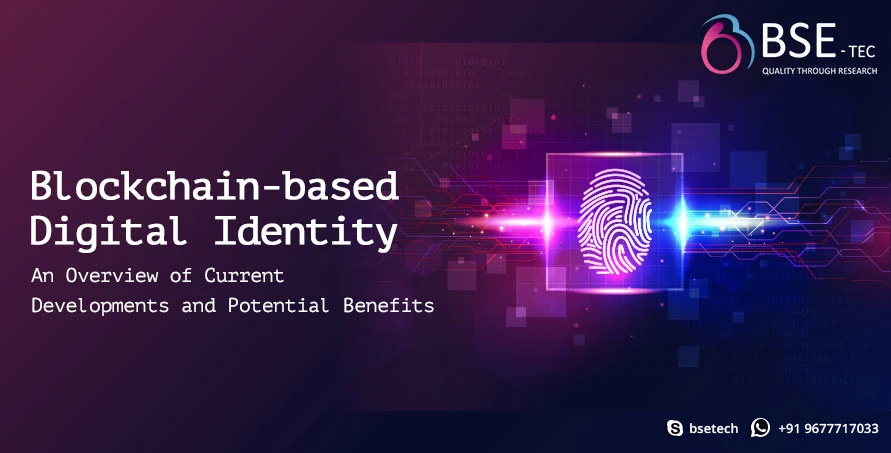Blockchain-based Digital Identity: An Overview of Current Developments and Potential Benefits

Digital identity is a unique id that lets you identify you in an online environment. Like the physical world the digital world also needs means of Identity verification and authentication methods without any data leak or security breach. But with the traditional digital identity methods we have more security issues and it is vulnerable to cyberattacks. So, here is a blog post on how blockchain based digital identity can help us overcome the challenges faced by the digital identity system and its potential benefits.
What is Digital identity?
Digital Identity is information about the individual that is available online or in digital formats. For example, the Unique ID, Aadhaar card number is a digital identity of a person from India. Digital credentials and identity are used everywhere in today’s day to day world. These digital identities are used to assert a person in the physical world.
Where digital identity is used?
- Opening accounts
Customer onboarding for banks and other financial institutions require Know Your Customer (KYC) procedure to authenticate and verify the identity of individuals when opening various types of accounts, such as bank accounts, social media accounts, or online shopping accounts.
- Age Verification
Digital identity is utilized to confirm the age of individuals for accessing age-restricted content or services, such as online gaming, gambling platforms, or adult websites.
- Job qualification verification
Digital identity systems are employed to verify the qualifications and credentials of job applicants, ensuring that the information provided is accurate and reliable.
- High risk transactions
Digital identity is utilized in high-risk transactions, such as large financial transfers or cryptocurrency exchanges, to establish the identity of the parties involved and mitigate the risk of fraud or illegal activities.
Challenges Faced By Traditional Digital Identity System

- Imposter Scams
The most recent annual Federal Trade Commission (FTC) report indicated that imposter scams were the second highest complaints tracked by the FTC and the highest fraud type. Traditional digital identity systems are vulnerable to imposter scams, where malicious individuals impersonate others and gain unauthorized access to sensitive information or perform fraudulent activities. For example, in imposter scams, the imposter scam consumers by telling them they won a prize and have to pay fees to receive it.
- Identity Thefts
Siloed collections of personal data are prone to inevitable attack. As the banks and other organizations store all the collected data in a single centralized database it is easy for the evil sources to get it hacked and use the information. Identity thieves exploit such vulnerable databases to steal personal information, leading to financial loss, reputation damage, or
- Attack of the Credit-Washing Bots:
Credit washing bots are automated programs that attempt to manipulate or bypass identity verification processes to carry out fraudulent activities, such as credit card fraud or money laundering.
Why Do You Need Blockchain For Digital Identity?
Blockchain-based digital identity is a concept that leverages blockchain technology to establish and manage digital identities in a secure, decentralized, and tamper-proof manner. It offers an alternative approach to traditional identity systems that are often centralized and prone to security breaches. Here’s an overview of current developments and potential benefits of blockchain-based digital identity:
- Self Sovereign Identity: One of the key concepts in blockchain-based digital identity is self-sovereign identity (SSI). SSI empowers individuals with control over their own identities, allowing them to manage and share their personal information as per their preferences and consent. Users can selectively disclose relevant identity attributes without revealing their entire identity, enhancing privacy and reducing reliance on third-party identity providers.
- Safety and Security: Blockchain’s inherent properties, such as immutability and cryptographic security, provide strong safeguards for identity information. Personal data can be encrypted, and transactions can be securely recorded on the blockchain, ensuring that only authorized parties can access and update the information. This helps protect against identity theft and unauthorized data access.
- Interoperability and Portability: Blockchain-based digital identity systems enable interoperability and portability of identity information across different platforms and services. Users can have a single digital identity that can be easily verified and recognized by multiple organizations, eliminating the need for redundant identity verification processes and reducing friction in accessing various services.
Overall, blockchain-based digital identity holds promise in revolutionizing how identities are managed, providing individuals with greater control, security, and accessibility while reducing fraud and inefficiencies in identity verification processes. Interested in blockchain based digital identity development? Get in touch with BSEtec for a free blockchain consultation.
Did you find this article useful? Let us know by leaving a comment below, or join us on Twitter and Facebook.




